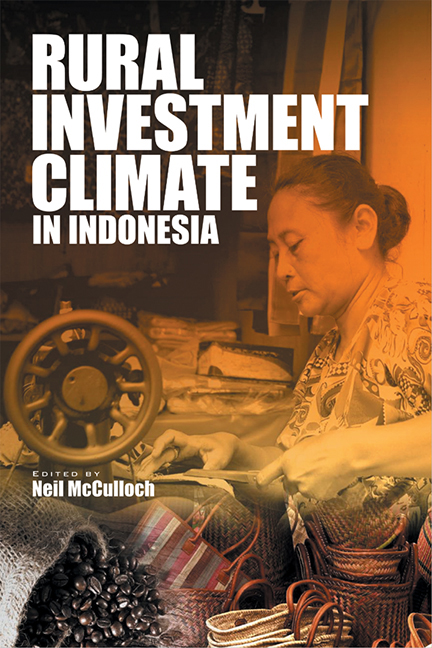Book contents
- Frontmatter
- Contents
- List of Tables, Figures, and Boxes
- Abbreviations and Acronyms
- The Contributors
- 1 Introduction
- 2 Agricultural Demand Linkages and Growth Multipliers in Rural Indonesia
- 3 Trends and Constraints Associated with Labour Faced by Non-Farm Enterprises
- 4 The Constraints in Accessing Credit Faced by Rural Non-Farm Enterprises
- 5 The Constraints Associated with Infrastructure Faced by Non-Farm Enterprises at the Kabupaten Level
- 6 Technology/Knowledge Transfer and Diffusion in Indonesian Non-Farm Enterprises
- 7 Marketing and Competition in the New Indonesia
- 8 Local Tax Effects on the Business Climate
- 9 Leadership and Voice in Local Governance
- 10 Insecurity and Business Development in Rural Indonesia
- Index
6 - Technology/Knowledge Transfer and Diffusion in Indonesian Non-Farm Enterprises
Published online by Cambridge University Press: 21 October 2015
- Frontmatter
- Contents
- List of Tables, Figures, and Boxes
- Abbreviations and Acronyms
- The Contributors
- 1 Introduction
- 2 Agricultural Demand Linkages and Growth Multipliers in Rural Indonesia
- 3 Trends and Constraints Associated with Labour Faced by Non-Farm Enterprises
- 4 The Constraints in Accessing Credit Faced by Rural Non-Farm Enterprises
- 5 The Constraints Associated with Infrastructure Faced by Non-Farm Enterprises at the Kabupaten Level
- 6 Technology/Knowledge Transfer and Diffusion in Indonesian Non-Farm Enterprises
- 7 Marketing and Competition in the New Indonesia
- 8 Local Tax Effects on the Business Climate
- 9 Leadership and Voice in Local Governance
- 10 Insecurity and Business Development in Rural Indonesia
- Index
Summary
Introduction
Non-farm firms must develop their capacity to enhance their efficiency and competitiveness to ensure their viability and sustained growth. A key element of capacity building is knowledge or technology development, that is the development of a firm's technological and associated managerial and marketing capabilities. This technology development can take place internally (inside the firm) or can be fostered through access to outside sources, including domestic firms, multinational companies (MNCs), technical licensing agreements, imported capital goods and the associated technical advice from the foreign equipment suppliers, technical information and advice from the firm's foreign buyers, universities, and government or private research institutes. Knowledge from outside sources can take various forms. For instance, in the form of technology embodied in imported capital goods or transferred through MNCs, or through the external economies from “knowledge or technical spillovers” from MNCs or modern local firms. Through these spillovers, non-farm firms, including firms in rural areas, can benefit from the “demonstration effects” of the use of modern technologies and management methods used by these MNCs. Since Indonesia, like other developing countries, is a net technology importer, knowledge/technology transfer from the advanced countries, plays a crucial role in developing the country's technological capabilities. Whether technology transfer will have a positive effect on the recipient firms or countries largely depends on the absorptive capacity of the firms/host countries, that is their ability to understand, assimilate, and make effective use of the transferred technology.
The purpose of this chapter is to study the international or cross-border technology transfer to Indonesia and the domestic diffusion of these transferred technologies among Indonesian firms. Based on a review of the international and Indonesian literature, the major channels of international technology transfer from foreign firms to local firms will be analysed and assessed as well as the subsequent domestic diffusion of these imported technologies among domestic non-farm firms. This domestic diffusion of imported technologies is at least as important as the international technology transfer, as the effective and widespread diffusion of the transferred technologies determines whether the technological capabilities (TCs) and associated managerial capabilities of Indonesia's non-farm firms will be enhanced.
- Type
- Chapter
- Information
- Rural Investment Climate in Indonesia , pp. 140 - 191Publisher: ISEAS–Yusof Ishak InstitutePrint publication year: 2009

